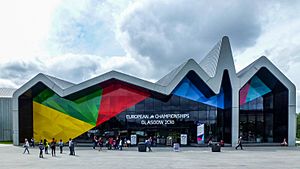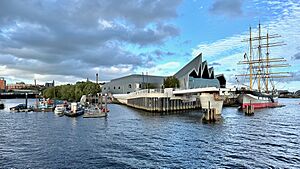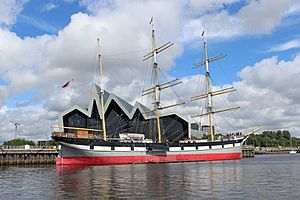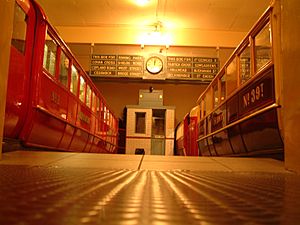Riverside Museum facts for kids
 |
|
| Established | April 14, 1964 (as Glasgow Museum of Transport) June 21, 2011 (as Riverside Museum) |
|---|---|
| Location | 100 Pointhouse Road, Partick, Glasgow, G3 8RS, Scotland, (The site overlaps Yorkhill Quay to the east) |
| Collection size | 3,000 objects |
| Visitors | 1,364,739 (2019) |
| Public transit access | |
The Riverside Museum is a super cool museum in Glasgow, Scotland! It's located right by the River Clyde in an area called Partick. The museum building itself is a modern masterpiece, designed by famous architects called Zaha Hadid Architects. It opened in June 2011 and even won the 2013 European Museum of the Year Award!
Inside, you'll find tons of amazing exhibits about transport, from old cars and trains to bicycles and ships. It's a place where you can explore how people and things have moved around for centuries. Plus, there's a special bridge, the Govan–Partick Bridge, that opened in 2024. It lets people walk or cycle right from the museum across the Clyde to another area called Govan.
Contents
Museum's Journey: From Old to New
The Riverside Museum has an interesting history, changing locations a few times before finding its current home.
Glasgow Museum of Transport: The Early Years
The museum first opened its doors on April 14, 1964. Back then, it was called the Glasgow Museum of Transport. It started after Glasgow stopped using its old tramway system in 1962.
- First Home: The museum was first located in an old tram depot in a place called Pollokshields.
- Second Home: In 1988, it moved to the Kelvin Hall. This big building was once an exhibition center. It was changed in 1987 to hold both the museum and a sports arena.
- Closing the Kelvin Hall Site: The Kelvin Hall museum closed in April 2010. All its amazing collections were then prepared for their big move to the new Riverside Museum.
Riverside Museum: Its Current Home

The new Riverside Museum opened on June 21, 2011. It's built right where the River Kelvin meets the River Clyde. This spot is special because it's where the old A. & J. Inglis shipyard used to build ships, like the famous PS Waverley.
- Home for a Tall Ship: The location also means that the historic tall ship Glenlee can be docked right next to the museum. Other visiting boats can also stop by.
- Who Designed It: The building was designed by Zaha Hadid Architects and engineers Buro Happold. The cool displays inside were created by a company called Event Communications.
Building the Riverside Museum
Building such a big and unique museum cost a lot of money. About £74 million was needed!
- Funding: Most of the money came from Glasgow City Council and the National Lottery Heritage Fund.
- Donations: The rest was raised through donations from companies and people who wanted to help build this amazing place.
- Construction: The main builders were BAM Construct UK Ltd. The building was finished on June 20, 2011, and opened to the public the very next day!

Amazing Collections and Exhibits
The Riverside Museum is packed with over 3,000 objects that tell the story of transport.
Road Vehicles: Cars, Bikes, and More!
The museum has an incredible collection of road vehicles.
- Oldest Bike: You can see one of the oldest surviving pedal cycles!
- Scottish Cars: It has the best collection of cars and trucks made in Scotland. This includes early models from companies like Argyll, Arrol-Johnston, and Albion.
- Modern Cars: More recent Scottish-built cars, like the Hillman Imp, are also on display.
- Variety of Transport: You'll find all sorts of vehicles, from old horse-drawn vehicles to fire engines, motorcycles, and even caravans. There are even toy cars and prams!
Ship Models: Giants of the Clyde
In a special area called the Clyde Room, there are about 250 ship models. These models show how important the River Clyde and its shipbuilders were to sea travel and the Royal Navy.
- Famous Ships: You can see models of famous ships like the Comet from 1812, the Hood, the Howe, the Queen Mary, the Queen Elizabeth, and the QE2.
Trains and Public Transport: Riding Through Time
Glasgow was also very important for building locomotives (train engines). The museum celebrates this railway history.
- Locomotives: You can see impressive locomotives like the Caledonian Railway's Caley No. 123, the Highland Railway's No. 103, and the North British Railway's 256 "Glen Douglas."
- South African Locomotive: A special addition is the South African Railways' 15F 4-8-2 no. 3007 steam locomotive. It was built in Glasgow in 1945!

- Glasgow's Public Transport: The museum also shows how Glasgow's public transport system changed over time. You can see seven different Glasgow Corporation Tramways tramcars and Glasgow Corporation trolleybuses.
- Kelvin Street: There's a cool recreation of "Kelvin Street" that looks like Glasgow in the 1930s. It even has a full-size replica of an old Glasgow Subway station!
Images for kids
See also
 In Spanish: Riverside Museum para niños
In Spanish: Riverside Museum para niños
- Culture in Glasgow
- Scottish Tramway and Transport Society
- A. & J. Inglis shipyard at Pointhouse Quay, where more than 500 ships were built
- Titan Clydebank
- Scottish Maritime Museum
- List of transport museums (around the world)
- Summerlee Museum of Scottish Industrial Life











